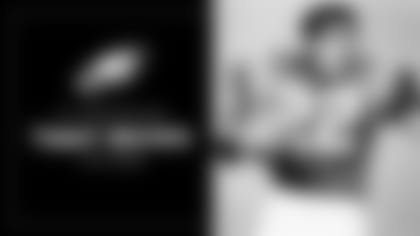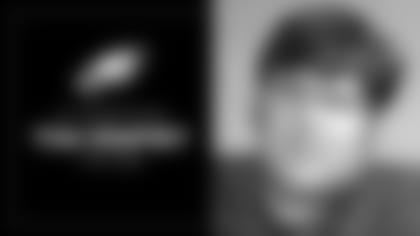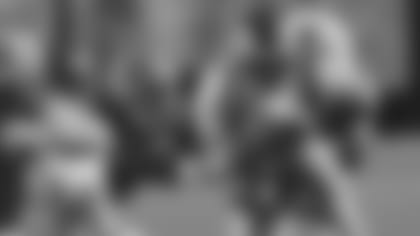Sunday's Eagles-Bears game was flexed to prime time. A game that was scheduled for 1 p.m. now will be played under the lights at Lincoln Financial Field. Flexing is a way for the TV networks to ensure an attractive matchup for their marquee games. No TV executive wants to get stuck with, say, Tampa Bay at St. Louis in Week 16.
If flexing was around in 1970 when Monday Night Football debuted on the ABC network, the Eagles almost certainly would have lost their one primetime appearance and the nation would have missed out on seeing a highly entertaining game. It was a Week 10 matchup of the Eagles, who were 1-7-1, and the New York Giants, who were 6-3. The suits at ABC would have pulled the plug on that one if they could.
But consider what they would have missed ...
- The Eagles playing their best game of the season and upsetting the Giants, 23-20.
- The fans celebrating like a college crowd by tearing down the goalposts at Franklin Field.
- And, most memorably, a tipsy Howard Cosell bailing out of the broadcast booth at halftime.
OK, maybe the ABC execs could have done without the last part, but the point is what appeared to be an utterly meaningless game turned out to be one of the most talked about games of the season. That's the beauty of pro football, you just never know.
Any longtime Eagles fan remembers the game. It was unseasonably cold for November 23rd. It was more like late December. The wind chill was below zero. Winds were gusting at 25 miles an hour. It was so bitterly cold that many Eagles players put Saran Wrap around their feet to prevent frostbite.
The Eagles were in their final season at Franklin Field and as much as love the place I have to admit it was a little short on amenities. There were no heated suites, no cozy superboxes, nowhere to hide from the elements. The fans sat on cold wooden benches. The only thing they had to keep them warm was whatever they had in their flask. Still, 59,117 fans were there, almost a full house.
It was no better for those of us who covered the game. The frigid wind whipped through the open press box, carrying away flip cards and tipping over coffee cups. It was so cold that all three of my pens froze. I wound up charting the game with a pencil I borrowed from Jim Gallagher, the Eagles PR director. The mimeograph machine iced up so they were unable to crank out stat sheets. We were still working on typewriters so you can imagine how hard it was to pound out our stories while wearing gloves.

It was so cold in the press box that every few minutes you had to get up and walk around to make sure your feet didn't freeze. Without printed stats, guys were reduced to shouting, "How many passing yards for Tarkenton?" And someone down the row would shout back an answer. Maybe it was right, maybe it was wrong. Frankly, that night was more about survival than reporting.
The Cosell story was a fascinating sidebar to the game. In 1970, Monday Night Football was a huge national story. When it was first conceived by Commissioner Pete Rozelle most people predicted it would fail. The thinking was after watching college football on Saturday and pro football on Sunday, most folks wouldn't feel the need to watch more football on Monday night. But ABC sports honcho Roone Arledge presented the game in a different way: more camera angles, more up close and personal stuff and with the hiring of Cosell, more controversy. As a result, the Monday night game generated a special kind of buzz.
That first year when the Monday night crew came into a town, it was a big deal. There were civic luncheons and page one stories. The broadcasters - Keith Jackson, Don Meredith and Cosell - were treated like rock stars. The fans enjoyed the folksy humor of Meredith and the way he played off the bombastic Cosell. It was an odd mix but give Arledge credit; it worked. The Monday night booth has been trying to replicate that chemistry for the past 30 years and hasn't come close.
When the Monday night team came to Philadelphia that season, Eagles owner Leonard Tose rolled out the red carpet. The night of the game, Tose hosted a lavish dinner on the Penn campus with tuxedoed waiters serving filet mignon and lobster and pouring the best champagne. It was open to all the working press but, really, it was for the network stars. Cosell was drinking martinis to brace himself for the long, cold night ahead. Apparently, he overdid it.
As authors Marc Gunther and Bill Carter wrote in the book, Monday Night Mayhem, "Suddenly, with a few minute to go (before halftime), Cosell went white. He pitched forward and threw up all over Meredith's cowboy boots."
Arledge met with Cosell at halftime and decided he was in no shape to continue. He instructed the policeman assigned to Cosell (he was such a big star he needed his own security) to get him back to New York. The cop quietly helped Cosell out of the stadium and onto the street where he hailed down a cab. Cosell took the taxi back to his Manhattan apartment. The tab: $92 without the tip.
At the start of the second half, Jackson told the TV audience Cosell had taken ill (he didn't mention the martinis) and wouldn't be back for the remainder of the game. Jackson and Meredith stayed for what proved to be an exciting finish with Eagles quarterback Norm Snead throwing a touchdown pass to backup tight end Fred Hill to win the game. When it ended, the fans who had little to celebrate all season poured onto the field, tore down the goalposts and carried them off into the night.
And if the game had been flexed, we would missed out on all that.
An award-winning writer and producer, Ray Didinger was inducted into the Pro Football Hall of Fame in 1995. He has also won six Emmy Awards for his work as a writer and producer at NFL Films. The five-time Pennsylvania Sportswriter of the Year is a writer and analyst for Comcast SportsNet. Didinger will provide Eagles fans a unique historical perspective on the team throughout the season for PhiladelphiaEagles.com. You can read all of his Eagles History columns here.















